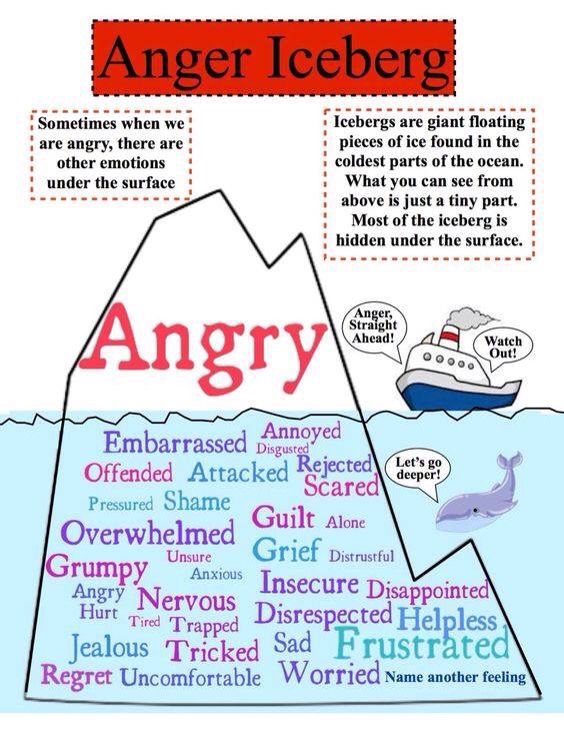“The average adult experiences anger about once a day and becomes annoyed or peeved about three times a day.”
What is Anger?
Anger is one of our natural inbuilt ‘mammalian’ defences which is designed to keep us safe from danger. Anger is ‘fight’ and the other defences are freeze, submit, flight and attach.
We use anger to defend ourselves or to keep others at a distance as it keeps people away from us.
Anger is a healthy and useful tool if used in the right way. It is full of energy so we can achieve what we need to – whether it be asserting our boundaries or needs or defending ourselves.
Our mammalian defences are instinctual and rapid and they bypass our frontal cortex (the part of the brain responsible for logic and reasoning) as this would slow down our survival responses as we react from the reptilian and limbic parts of our brains.
If our anger responses have become distorted due to childhood circumstances then our ‘software’ needs to be updated, so to speak, so that our anger response becomes a healthy defence which is used in a constructive way.
We can do this by using mindfulness techniques to develop our self-awareness of our reactions and the reasons for them.
Our Bodily Reactions
When we feel anger, our bodies prepare for action, neurotransmitter chemicals known as catecholamines are released in our brains which cause us to experience a burst of energy which can last for several minutes. This enables us to take immediate protective action. Our heart rate accelerates, blood pressure rises, our rate of breathing increases, and increased blood flow enters our limbs ready for physical action. We lock our attention onto the target of our anger. Additional brain neurotransmitters and hormones (adrenaline and noradrenaline) are released which trigger a lasting state of arousal. We are now physically primed for action.
Styles of Anger
Passive-Aggressive Anger
When people do not feel able to express their anger in a direct, assertive way they may communicate it in passive-aggressive ways such as procrastinating, being stubborn, being inefficient, teasing others or making insulting ‘jokes,’ back-handed compliments or ‘forgetting’ to do tasks. Sarcasm is also passive-aggressive if the underlying meaning is insulting in some way.
People-pleasers may express their anger in passive-aggressive ways as they may fear rejection if they express themselves honestly, or they have been conditioned in childhood to be unable to express their anger in a healthy way as they have been told that ‘anger is bad.’
They may have guilt and shame attached to expressing themselves honestly. This is because maladjusted parents will shame their children for expressing anger as they want submission from their children and anger is not submissive.
Aggressive Anger
Some people who are triggered into anger can find that they cannot control themselves, or they may become physically or emotionally aggressive or violent.
They may be very hurtful to others. This type of anger can be destructive, and it is important to learn how to manage this. Managing extreme anger can be difficult as our defence responses are run from our reptilian brains and our logical brains are ‘offline’ temporarily when we are consumed by an anger response.
Developing self-awareness and finding the root of the extreme anger reactions will be helpful. It can also be helpful to familiarise yourself with the early physical warning signs that you are becoming angry and then interrupt the escalation by taking three deep breaths, changing the environment or expressing your feelings in an assertive but not aggressive way.
Repressed Anger
If our anger responses have become distorted due to childhood circumstances, then our ‘software’ needs to be updated (through mindfulness and self-awareness) so that our anger response becomes a healthy defence which is used in a constructive way.
In some homes anger is not permitted and this can result in repressed anger. It was unsafe to show it in childhood, so it had to be repressed with the fight, freeze or submit response. Many people in that situation then go on to hold the ingrained belief that anger is bad and this may lead to it being expressed in inappropriate or destructive ways. It may only come out when people are under the influence of drugs or alcohol or when they are triggered in some way and then it can be an all-encompassing, overwhelming emotion which is unshakeable in that moment and can continue for some time.
Many people will feel guilt or shame when they start to feel anger.
Displaced Anger
When anger is displaced, it means that it is directed away from it’s genuine source/cause towards another person or an object. Also known as misplaced anger, the genuine source of the anger is generally rooted in childhood and as a coping mechanism developed at that time, the person learns to manage their anger by either directing inwards towards themselves or towards an undeserving other as this feels safer. When the focus of an individual’s misplaced anger is their partner or family member it can cause major issues in relationships.
Triggers to Anger
We may find that we are triggered to anger if we are in a situation which reminds us of previous times we have been hurt. Physical and emotional clues that we have been triggered are shallow breathing, hyperventilation, holding the breath, obsessive thinking, a response which is disproportional to the event, 0-to-60 reactions, muscle tension – especially in the shoulders and chest and jumping to conclusions or catastrophising.
Understanding and Expressing Anger
Anger Iceberg
The Anger Iceberg reminds us that when we are feeling angry we are often protecting ourselves from other emotions. Anger is a useful tool as it is full of energy which helps us to act and it keeps others away from us. It can help with our self-awareness to identify which feelings may be below the surface.
Sometimes out emotions can be likened to an onion – to get to the root of the anger we need to get through the layers and see what feelings are underlying.

Unsent letters
It can be cathartic to write a letter (which we will not send) to a person we are angry with, this can help us to articulate our feelings, so we know how we feel. We can then rip up or burn the letter or keep it to read in the future. This gets the ‘stuck’ feelings out and can help us to feel lighter.
Physical Ways of Getting Anger Out
Physical, tactile activities like ripping up paper, punching a pillow, screaming into a pillow, or do some physical exercise or a sport like boxing.
Unresolved anger can sometimes be trapped in the body and therefore these are good ways to finally release it.
Over time much of the repressed anger will be released and you will be calmer.
Art Therapy
Art therapy can help people who are artistically minded to express their feelings. Feelings can be painted or drawn in the colours and shapes you imagine them in. There are some interesting ideas at the website below.
https://www.alternativetomeds.com/blog/art-therapy-ideas/
Forgiving Yourself
Forgive yourself for feeling angry – this can be difficult if we have ingrained beliefs that anger is bad, this may feel uncomfortable at first, but this will decrease over time. Explore why you feel so guilty or embarrassed about your angry feelings.
Talking Therapy/Trauma Therapy
If there is a lot of underlying or uncontrollable anger and unresolved issues then therapy can often help.
Expressing Anger in a Healthy Way
If the parties involved in a dispute are all reasonable people (and not abusive in some way) then mediation and negotiation are the way forward.
The healthiest way to express anger is politely and assertively. It can be good to arrange a time to have a discussion and then for all parties to express their feelings. It can be more productive to use ‘I’ statements (I feel annoyed and sad because) rather than ‘you’ statements (you have really annoyed me because).
After expressing feelings, all parties can come to an agreement about a way forward that is satisfactory for all.



